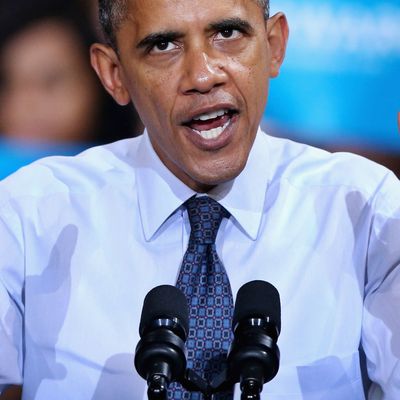
A week after the first presidential debate, Mitt Romney has wiped out President Obama’s lead in the national polls, but still appears to trail in most swing states. Obama, in particular, continues to lead every poll in Ohio, which is developing into his firewall. The apparent split between the national vote and the electoral college has some analysts, like Nate Silver, groping for an explanation, but the answer seems fairly obvious to me: Swing states have been soaked in political information for months, with round-the-clock advertising, campaigning, and local news coverage of candidate love-bombing. The non-swing majority of America hasn’t. New information from the debates is more likely to change your mind if you just tuned in to the Denver debate than if you had been hiding under your sofa while Obama and Romney pounded down your front door.
So one way to look at this is that Obama has merely received an October scare. Romney won what was, by public opinion measures at least, the biggest debate victory in presidential campaign history, and yet he still hasn’t gotten over the top.
The other way to look at it is that three debates still remain. And it’s far from clear Obama will make up for the damage of the first. Indeed, he may well simply compound it. Obama was far too passive in the first debate, but the reason for his passivity was that he wanted to avoid appearing angry and unpresidential. That’s not an irrational fear. And it’s entirely possible that he will err in the opposite direction in the course of trying to correct his initial mistake.
That’s not the most likely scenario, but it is a plausible one. The scary thing for partisans of either side is that it’s getting frighteningly easy to envision a scenario in which the electoral college ties. Of the swing states, Obama’s lead appears safest in New Hampshire and Ohio. That plus his safe states would bring him to 259 electoral college votes. And in Wisconsin, with its ten electoral votes, he’s at the dread 269–269. If we must stick with a preposterous electoral system that encourages both parties to ignore three quarters of the country — and some of us would argue we mustn’t — can’t we at least have an odd number of electoral votes? If Obama does pull out a win despite losing the electoral college, perhaps this would finally incent Republicans to abandon their opposition to reforms like the National Popular Vote.
And if the Obama panic does ebb, and he resumes his lead, I hope this instills a bit of compassion in the liberal side. I concede that compassion toward one’s ideological adversaries is not necessarily my personal strong point. But the Obama debate fiasco has exposed his supporters to the emotional dynamic that Romney’s partisans have been feeling for months, as they’ve observed their candidate dying a slow political death.
The emotional response has been very different — Republicans have lashed out at the polls and even at the economic statisticians, while Democrats have wallowed in depression — but the underlying sentiment is the same. Watching your candidate lose, in an election where you think your whole sense of what American government stands for is at stake, really sucks. If Obama does return to (or, perhaps, hold) his advantage, we liberals ought to remember the post-Denver feeling. A key liberal insight is that the marketplace is cruel and often unfair to its losers. The same holds true of politics.






























